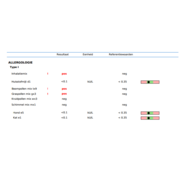Allergy
Allergy testing can help identify what substances you are allergic to so you can avoid them or appropriate treatments,
Palladium poisoning
€ 69,-
This blood test is done to measure the palladium load. This occurs in the si...
Cobalt allergy
€ 35,-
Only products containing cobalt in larger quantities can cause allergic reac...
Follow-up test allergy inhalation mix
€ 198,- € 176,-
Please note these follow-up tests are automatically performed by Labstein. The cost will be a...
What Can I Eat IgE Meal
€ 187,- € 209,-
IgE Food Screening Medium; test for food allergy to 40 foods.
Allergy Test RAST Galactose Alpha 1.3
€ 39,-
The test for Galactose-alpha-1,3-galactose from bovine thyreoglobulin is a blood test that w...
Anti-gliadin and anti-transglutaminase RP
€ 79,-
Gliadin is a gluten protein that can trigger intestinal inflammation (including celiac disease and disease v...

Food allergy
Allergy is a hypersensitivity reaction to harmless substances, such as pollen from trees, grasses or weeds. We then speak of hay fever. But one can also be allergic to animal dander, droppings of dust mites and fungi.
Our immune system protects our bodies against attacks and the penetration of foreign substances by making antibodies, among other things.
In the case of an allergy, the immune system is disrupted and makes antibodies (IgE) that cause adverse reactions. In the case of food allergy, the reaction occurs quickly, often within minutes to 2 hours. There is also a delayed reaction. This can occur up to 48 hours after eating the food. The culprit is then difficult to identify. There is also a non-allergic form of food hypersensitivity. Examples are lactose intolerance and sulfite hypersensitivity.
What is the difference between Food Intolerance and Food Allergy?
Food intolerance and food allergy are both reactions to food, but they are different in their cause, symptoms and treatment:
Food intolerance:
Cause: Food intolerance usually occurs because the body lacks certain enzymes needed to break down certain nutrients in food. Lactose intolerance is a common example, where the body lacks the enzyme lactase to digest lactose (milk sugar).
Symptoms: Food intolerance can cause symptoms such as abdominal pain, gas, diarrhea or bloating. These symptoms are usually less severe than allergic reactions.
Time of occurrence: Symptoms of food intolerance usually occur more slowly and may appear several hours or even days after eating the food in question.
Treatment: Food intolerance is usually managed by avoiding foods that cause the intolerance or using enzyme replacement supplements to improve digestion.
You measure this intolerance with IgG antibodies
Food allergy:
Cause: Food allergy is a reaction of the immune system to certain proteins in food. The immune system sees these proteins as harmful and reacts accordingly.
Symptoms: Food allergy can cause a wide range of symptoms ranging from mild to severe reactions, including skin rashes, itching, swelling, breathing problems, and in severe cases, anaphylaxis, a life-threatening allergic reaction.
Time of occurrence: Allergic reactions usually occur quickly, often within minutes to a few hours of eating the allergenic food.
Treatment: Treatment of food allergy includes completely avoiding the food causing the allergy, and in some cases an epinephrine injection may be needed to treat an anaphylactic reaction.
You measure this allergy with IgE antibodies.
In summary, food intolerance is usually not life-threatening and involves digestive problems, while food allergy is an immune response and can cause potentially serious, life-threatening reactions. It is important to understand the distinction between the two and make the correct diagnosis to take appropriate action.







